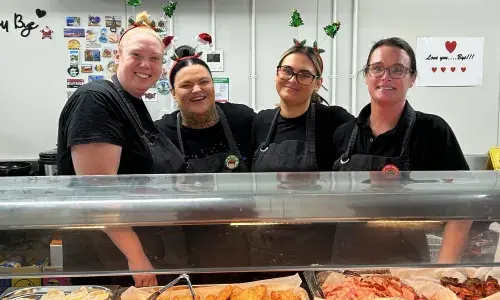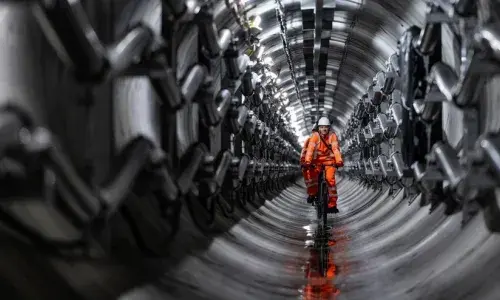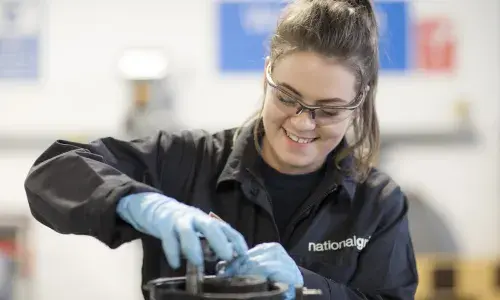
National Grid cyclists set to complete 200-mile ‘Tour de Wales’ bike ride in aid of the Trussell Trust
A team of National Grid engineers will be completing a challenging 200-mile cycle ride across Wales to raise money in aid of the Trussell Trust and to support local community food banks.
A team of National Grid engineers will be going the distance on a 200-mile cycle ride across Wales at the end of September, to raise money in aid of the Trussell Trust and to support local community food banks.
The nine cyclists will embark on their journey, which they will complete over the course of three days, from Pentir substation in North Wales on 27th September. They will then make their way south to Ebbw Vale, finishing on the 29th of September at National Grid’s Rassau substation.
The team will make a stop on each day to make donations at Trussell Trust food banks along the route – at centres in South Gwynedd, Builth Wales and finally Abergavenny.
Food donation hubs have been set up at several National Grid sites in the weeks leading up to the event. The cyclists will be accompanied by a support team of six additional volunteers and three National Grid electric vehicles (EVs) to help transport the donations to the food banks.
The Trussell Trust supports a network of food bank centres across the UK to provide emergency food to people who cannot afford the essentials, as well as providing connections and a wide range of support to help people lift themselves out of poverty. They campaign for change for people experiencing hardship and to end the need for food banks in the UK.
The planned cycle route covers a total elevation of 18,000 feet – which is more than the Three Peaks combined - and several of National Grid’s projects are located in or around the route.
Christopher Darby, Safety, Health, Environment and Quality (SHEQ) Manager, at National Grid Electricity Transmission said: “As a team, we have long admired the amazing work being carried out by the Trussell Trust to provide emergency provisions and support to people who are facing hardship.
“We are grateful to work for an organisation that has supported our ambition to raise money in aid of a charity that does such important work in providing critical help to people who need it.”
Pentir substation is currently undergoing works as part of the Dinorwig to Pentir cable replacement project, where National Grid is installing three new cable circuits between Dinorwig Power Station and Pentir substation. The original cables were installed in the 1970s and have been in reliable use ever since. They are now coming to the end of their operational life and are being replaced to ensure that electricity supplies remain secure and reliable for the local area and beyond.
The route will also pass closely to the Eryri Visual Impact Provision (VIP) project in the Eryri National Park, where a section of overhead line across the Dwyryd Estuary from Minffordd to Llandecwyn is being removed and replaced with electricity cables buried in a tunnel underground. This represents a major opportunity to conserve and enhance the natural beauty, wildlife, and environmental heritage of the precious landscape of Eryri.
The Eyri VIP scheme is part of National Grid’s wider VIP project, which is making use of a provision by Ofgem to carry out work that reduces the visual impact of existing transmission lines in English and Welsh Areas of Outstanding Natural Beauty (AONBs) and National Parks.
Contact for media information only:
Paige Phelps
National Grid
07543312572
mailto:[email protected]
Notes to Editors
About National Grid in the UK
National Grid sits at the heart of Britain’s energy system. The individual companies in our group run the networks and infrastructure that connect millions of people to the electricity they use every day.
Our regulated businesses own and develop the high voltage electricity transmission (ET) network in England and Wales, and the electricity distribution (ED) network in the Midlands, South West England and South Wales. Operating separately from these core regulated units, National Grid Ventures (NGV) focusses on competitive markets, investing in energy projects, technologies and partnerships such as electricity interconnectors.
We bring energy to life, with an ambition to serve our customers well, support the communities in which we operate, and make possible a clean, affordable and resilient energy network of the future.
About the Trussell Trust
We exist so we can all be free from hunger. Together, we’re more than 1,300 local food bank centres across the UK, providing practical support for people facing hardship. But emergency food isn’t a long-term solution to hunger. People need food banks when they don’t have enough money for the essentials. It’s not right that anyone needs a food bank to get by, and we can change this by ensuring everyone has enough income to eat, stay warm and stay dry. That’s why we also work with communities across the UK to change the things that push people to need a food bank.
Our network of food banks is supported by almost 12,000 churches, as well as many community groups, local businesses, schools and more than 28,000 dedicated volunteers. Together, we are thousands and thousands of people, from communities across the UK, working together towards a more just future.
We bring together data and evidence from food banks and the people who need them across the UK, gathering powerful information on the state of our society. Our research projects give the most in-depth picture of who needs a food bank and why, helping us co-create and advocate for solutions that will ensure all of us have enough money to afford the essentials.


